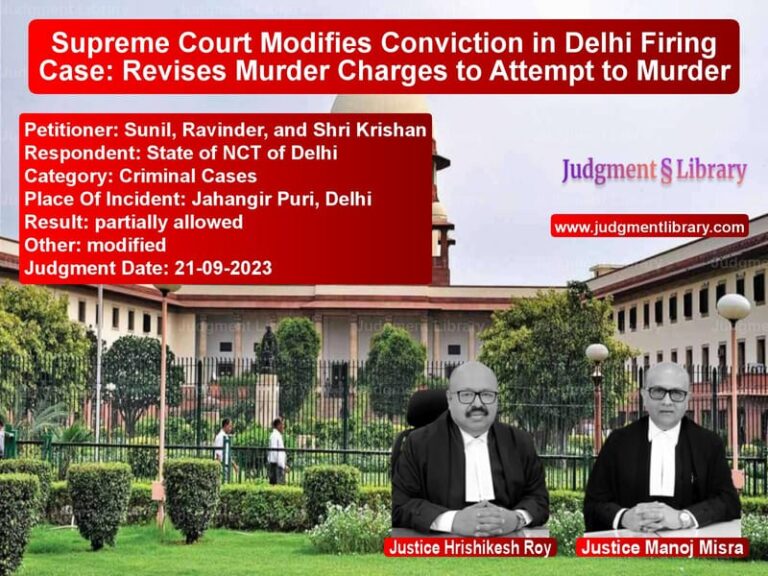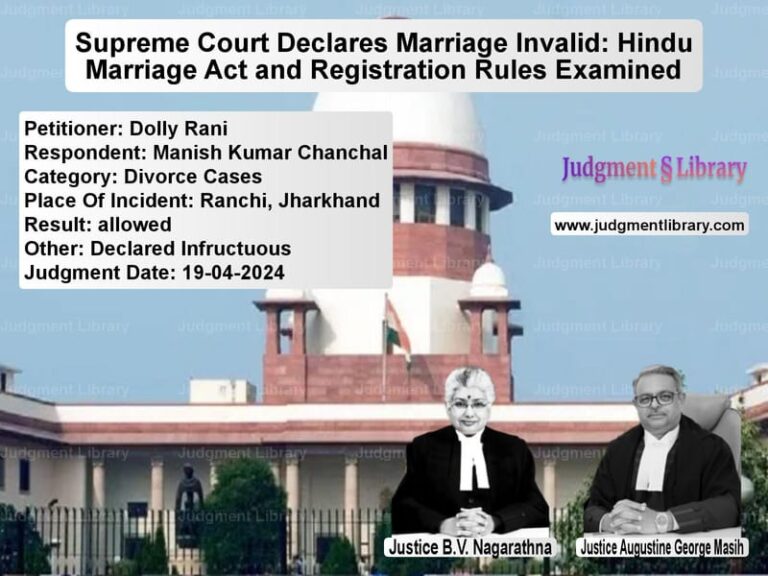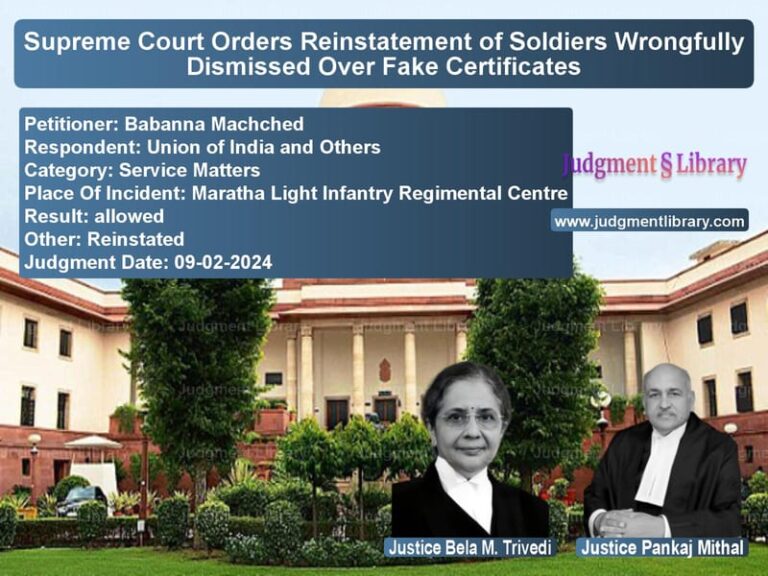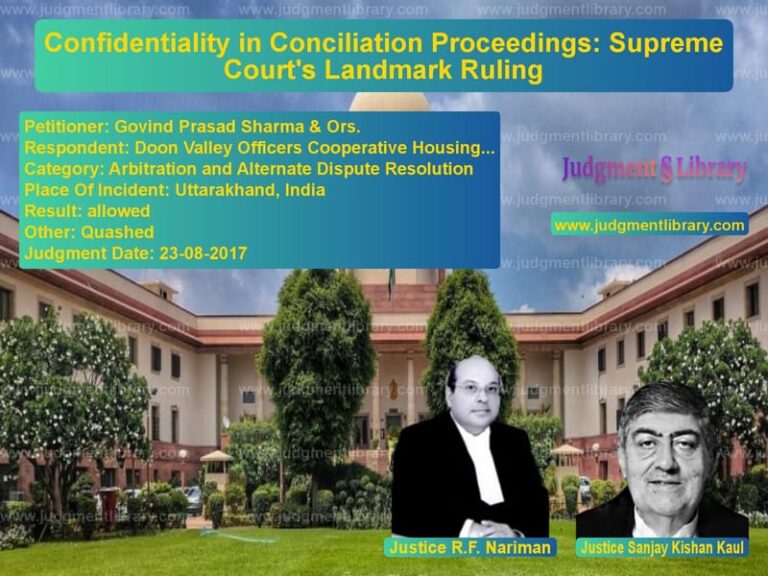Arbitration Ruling: No Pendente Lite Interest When Contractually Barred
The Supreme Court of India, in Garg Builders vs. Bharat Heavy Electricals Limited, ruled on a critical issue regarding the award of pendente lite interest in arbitration cases. The Court held that when a contract expressly prohibits the payment of interest, an arbitrator cannot grant such interest under the Arbitration and Conciliation Act, 1996. This judgment reinforces the importance of contractual terms in arbitration proceedings and limits the discretionary power of arbitrators.
Background of the Case
Bharat Heavy Electricals Limited (BHEL) floated a tender for constructing a boundary wall at its 2×750 MW Pragati III Combined Cycle Power Project at Bawana, Delhi. Garg Builders won the contract, and a formal agreement was executed on October 24, 2008. The contract contained a crucial clause:
Clause 17: “No interest shall be payable by BHEL on Earnest Money Deposit, Security Deposit, or on any moneys due to the contractor.”
Disputes arose between the parties, leading Garg Builders to invoke arbitration. Apart from various claims, they sought pendente lite and future interest at a rate of 24% per annum on the award amount.
Arbitration Award
The arbitrator ruled in favor of Garg Builders and awarded interest at 10% per annum from December 2, 2011 (date of claim petition) until realization of the award. The arbitrator reasoned that the contract did not explicitly prohibit interest for the pendente lite and future periods.
Challenges in the High Court
BHEL challenged the award in the Delhi High Court under Section 34 of the Arbitration and Conciliation Act, arguing that the arbitrator had exceeded his jurisdiction by granting interest despite the clear contractual prohibition.
The Single Judge of the High Court set aside the interest component of the award, stating:
“The arbitrator erred in holding that Clause 17 only barred pre-reference interest and not pendente lite interest. Section 31(7)(a) of the Arbitration Act limits the arbitrator’s power if the contract specifies otherwise.”
Read also: https://judgmentlibrary.com/supreme-court-directs-reconsideration-of-arbitration-in-msme-dispute/
The Division Bench upheld this ruling, leading Garg Builders to appeal to the Supreme Court.
Arguments Presented
Appellant’s (Garg Builders) Arguments:
- The arbitrator’s interpretation of Clause 17 was plausible and within his jurisdiction.
- Reliance was placed on Ambica Construction vs. Union of India, where the Supreme Court allowed pendente lite interest despite a contractual bar.
- Clause 17 violated Section 28 of the Indian Contract Act, 1872, by restricting the contractor’s legal rights.
Respondent’s (BHEL) Arguments:
- Section 31(7)(a) of the Arbitration Act gives paramount importance to contractual terms.
- Where an agreement explicitly prohibits interest, arbitrators lack the power to grant it.
- The Interest Act, 1978 allows parties to contract out of interest payments.
- The decision in Ambica Construction was based on the Arbitration Act, 1940, which lacked a provision equivalent to Section 31(7)(a) of the 1996 Act.
Supreme Court’s Ruling
The Supreme Court upheld the High Court’s decision and ruled that the arbitrator exceeded his jurisdiction by granting interest. Key observations included:
On Contractual Prohibition of Interest:
“If the contract prohibits pre-reference and pendente lite interest, the arbitrator cannot award interest for these periods.”
The Court emphasized that Clause 17 was broad and covered all money due to the contractor, including arbitration awards.
On the Importance of Section 31(7)(a) of the Arbitration Act:
“This provision restricts arbitrators from granting interest if parties have agreed otherwise. It must be given effect.”
The Court distinguished this case from Ambica Construction, noting that the earlier decision was based on the 1940 Act, which did not contain a provision similar to Section 31(7)(a).
On the Indian Contract Act:
The Court dismissed the argument that Clause 17 violated Section 28 of the Indian Contract Act. It ruled:
“Section 28 does not prohibit interest-barring clauses. Such clauses do not extinguish rights but merely limit monetary claims.”
On the Interest Act, 1978:
The Court cited Section 3(3) of the Interest Act, which permits parties to contract out of interest claims. It concluded:
“Since the law allows parties to waive interest claims, contractual clauses barring interest are valid.”
Legal Precedents Considered
The Supreme Court reaffirmed its stance from previous rulings:
- Sayeed Ahmed & Co. vs. State of Uttar Pradesh (2009) – Held that if a contract bars interest, arbitrators cannot override it.
- Bharat Heavy Electricals Ltd. vs. Globe Hi-Fabs Ltd. (2015) – Ruled that arbitration awards must respect contractual prohibitions on interest.
- Sri Chittaranjan Maity vs. Union of India (2017) – Clarified that Ambica Construction does not apply under the 1996 Arbitration Act.
Impact of the Judgment
This ruling has far-reaching implications for arbitration and contract law in India:
- Arbitrators cannot grant interest contrary to contractual agreements.
- Parties must carefully draft contracts to ensure clarity in interest-related clauses.
- Section 31(7)(a) of the Arbitration Act limits the discretionary power of arbitrators.
- The judgment discourages frivolous claims for pendente lite interest where contracts explicitly prohibit it.
Conclusion
The Supreme Court’s decision in Garg Builders vs. BHEL reinforces the sanctity of contracts in arbitration. By upholding the contractual prohibition on interest, the ruling ensures that arbitrators adhere strictly to the terms agreed upon by parties. This case serves as a precedent for future disputes where interest claims arise in arbitration.
Petitioner Name: Garg Builders.Respondent Name: Bharat Heavy Electricals Limited.Judgment By: Justice S. Abdul Nazeer, Justice Krishna Murari.Place Of Incident: Delhi.Judgment Date: 04-10-2021.
Don’t miss out on the full details! Download the complete judgment in PDF format below and gain valuable insights instantly!
Download Judgment: garg-builders-vs-bharat-heavy-electri-supreme-court-of-india-judgment-dated-04-10-2021.pdf
Directly Download Judgment: Directly download this Judgment
See all petitions in Arbitration Awards
See all petitions in Enforcement of Awards
See all petitions in Dispute Resolution Mechanisms
See all petitions in Judgment by S. Abdul Nazeer
See all petitions in Judgment by Krishna Murari
See all petitions in dismissed
See all petitions in supreme court of India judgments October 2021
See all petitions in 2021 judgments
See all posts in Arbitration and Alternate Dispute Resolution Category
See all allowed petitions in Arbitration and Alternate Dispute Resolution Category
See all Dismissed petitions in Arbitration and Alternate Dispute Resolution Category
See all partially allowed petitions in Arbitration and Alternate Dispute Resolution Category







